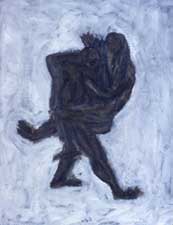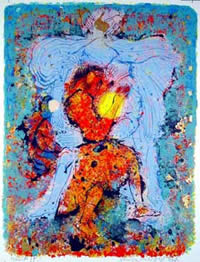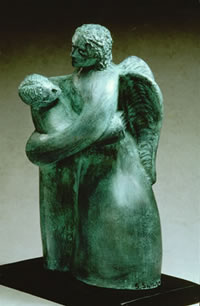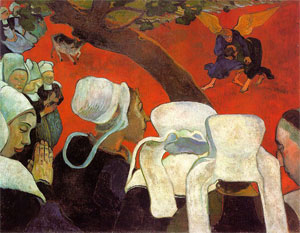Fighting the Long Defeat:
Dark Struggles and Divine Blessings
For Sunday October 17, 2010
Lectionary Readings (Revised Common Lectionary, Year C)
Jeremiah 31:27–34 or Genesis 32:22–31
Psalm 119:97–104 or Psalm 121
2 Timothy 3:14–4:5
Luke 18:1–8
Jacob was a man on the run. He had his reasons.
Chronic dysfunctions and deep hostilities characterized Jacob's family history. Because his parents Isaac and Rebekkah played favorites, he and his fraternal twin Esau hated each other. Jacob also swindled Esau out of his family birthright, which entitled him to a double share of the family inheritance. Later, he and his mother lied to swindle the family blessing from his blind and dying father.
 |
.Jacob Wrestles the Angel,
oil, by Mel Pekarsky. |
When Esau threatened to murder him, Jacob fled to his uncle Laban in Haran, the very place his grandfather Abraham had departed. There he married his cousins Rachel and Leah, and fathered thirteen children with them and his two slaves Zilpah and Bilhah. Sick of his father-in-law's manipulations, Jacob fled Laban, only to encounter his long lost and embittered brother Esau. The consummate deal-maker, Jacob concocted a bribe and sent a caravan of gifts along with his women and children across the river Jabbok. Perhaps that would pacify his brother's murderous threats?
Physically exhausted and deeply anxious, alone in the desolate wilderness, shorn of all his worldly possessions, at long last powerless to control his fate, Jacob collapsed into a deep sleep on the banks of the Jabbok River. With Laban behind him and Esau in front of him, he was too spent to struggle any longer. Darkness descended.
 |
Jacob and the Angel, Serigraph, 1965, by Shraga Weil. |
That's when his real struggle began. Fleeing his family history had been bad enough; wrestling with God himself was a different matter altogether. That long and lonely night an angelic stranger visited Jacob. They wrestled through the night until daybreak, at which point the stranger crippled Jacob with a blow to his hip that disabled him with a limp for the rest of his life. Jacob discerned what had happened, declaring, "I saw God face to face, and yet my life was spared" (Genesis 32:30).
When it was over, the Deceiver, for such is the meaning of "Jacob" in Hebrew, received a new name, Israel, which means "he struggles with God." Most important and paradoxical of all, at the conclusion of that riverbank struggle, God "blessed him there" (Genesis 32:29). Yes, God blessed the deceiver who struggled in darkness, the man who lied to his blind father and swindled his brother.
Our culture programs us to abhor weakness, failure, struggle, and doubt. Even though we know that a measure of vulnerability, fear, discouragement and depression accompany most normal lives, we construe these as signs of failure or even a lack of faith. In real life, though, such naive optimism and rosy rhetoric are a recipe for disappointment and discouragement, for sooner or later reality catches up with most of us.
Jacob jerks us back to reality. Frederick Buechner characterizes Jacob's divine encounter at Jabbok as the "magnificent defeat of the human soul at the hands of God."
 |
Jacob Wrestles With an Angel, Terracotta with bronze patina, by Scott Sullivan. |
Similarly, in her book Scarred By Struggle, Transformed By Hope, the Benedictine nun and writer Joan Chittister uses the Jacob story as a paradigm for a "spirituality of struggle." In Jacob's story she identifies eight elements of our human struggle—change, isolation, darkness, fear, powerlessness, vulnerability, exhaustion, and scarring.
But God doesn't leave us there, says Chittister, and in each human struggle she finds a corresponding divine gift — conversion, independence, faith, courage, surrender, limitations, endurance, and transformation. "Jacob does what all of us must do," writes Chittister, "if, in the end, we too are to become true. He confronts in himself the things that are wounding him, admits his limitations, accepts his situation, rejoins the world, and moves on."
In Tolkien's The Lord of the Rings, the elves of Lothlorien admit that they are losing their fair forest lands. But they battle on, characterizing their struggle as “fighting the long defeat.” In Letters of Tolkien (195) Tolkien describes our human struggle using identical language: "Actually, I am a Christian, and indeed a Roman Catholic, so that I do not expect 'history' to be anything but a 'long defeat' — though it contains (and in a legend may contain more clearly and movingly) some samples or glimpses of final victory."
Tolkien is probably the source of the comment made by the medical doctor Paul Farmer, who has fought what you might call a "losing battle" for health care for the poor. In Tracy Kidder's biography of Farmer called Mountains Beyond Mountains, Farmer says, “I have fought the long defeat and brought other people on to fight the long defeat, and I’m not going to stop because we keep losing. Now I actually think sometimes we may win. I don’t dislike victory. . . We want to be on the winning team, but at the risk of turning our backs on the losers, no, it’s not worth it. So you fight the long defeat.”
 |
Jacob Wrestles the Angel, by Paul Gauguin, 1888. |
The end result of the nocturnal struggle for this greedy polygamist, cheater and liar was God's blessing: "God blessed Jacob there" (32:29). When you read further in Jacob's story these twin themes of dark struggles accompanied by divine blessing continue to be intertwined. His daughter Dinah was raped. Two of his sons, Reuben and Judah, committed incest. As if to mimic his own parents who favored him over Esau, Jacob played favorites with his own son Joseph, sewing seeds of fraternal enmity for all.
And yet God renewed his covenant with Jacob. "God appeared to him again and blessed him" (35:9). Late in life he reminisced, "God almighty appeared to me at Luz in the land of Canaan, and there He blessed me" (48:3). We may struggle with God through the darkness, and experience defeat in the process, but by daybreak he only intends to bless us.
For further reflection
* In the book Mother Teresa: Come Be My Light (2007), Mother Teresa's correspondence documents her fifty-year struggle with darkness and doubts, with "the absence of God's presence." “If I ever become a Saint," she wrote, 'I will surely be one of 'darkness.' I will continually be absent from Heaven — to light the light of those in darkness on earth.”
* What has been your own experience of "fighting the long defeat?"
* Cf. Paul, who wrote that he was "harassed at every turn — conflicts without, fears within" (2 Corinthians 7:5).
Image credits: (1) Mel Pekarsky, Stony Brook University; (2) Shraga Weil, Safrai Fine Art; (3) The Art of Scott Sullivan; and (4) Cgfa.sunsite.dk.





